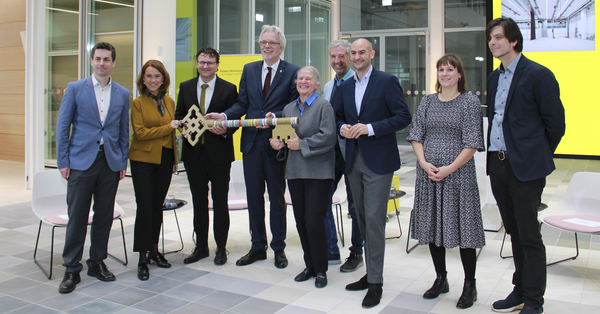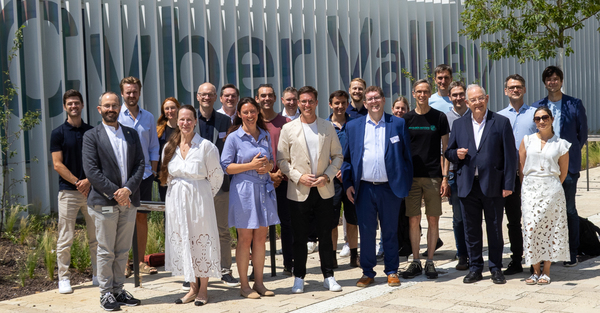Yoshua Bengio hält Max Planck Lecture 2020
Der diesjährige Vortrag findet am 23. Juni online statt

Stuttgart - Der mehrfach preisgekrönte Informatiker Professor Yoshua Bengio hält am 23. Juni um 17:30 die Max Planck Lecture 2020, die in diesem Jahr virtuell stattfinden wird. Der Vortrag trägt den Titel "Machine Learning for COVID-19 Risk Awareness through Contact Tracing“ und wird vom Max-Planck-Institut für Intelligente Systeme veranstaltet.
Bengio ist ein Pionier auf dem Forschungsgebiet selbstlernender Maschinen. Zusammen mit einer Handvoll anderer herausragender Wissenschaftler gilt Bengio weithin als einer der „Väter der Deep-Learning-Revolution“. Im Jahr 2018 wurde er zusammen mit seinen Kollegen Geoffrey Hinton und Yann LeCunn mit dem Turing-Preis ausgezeichnet für seine konzeptionellen und experimentellen Arbeiten, die künstlichen neuronalen Netzen zum Durchbruch verholfen haben. Der Turing-Preis ist der weltweit bedeutendste Preis für Informatik und vom Ansehen her mit dem Nobelpreis vergleichbar.
„Yoshua Bengio hat jahrzehntelang das Forschungsfeld Deep Learning und Machine Learning wesentlich vorangetrieben und viele andere dabei unterstützt. Wir fühlen uns zutiefst geehrt, dass er dieses Jahr die Max Planck Lecture hält", sagt Bernhard Schölkopf, Direktor am MPI-IS in Tübingen, im Namen seiner Direktoren-Kolleg*innen Katherine J. Kuchenbecker, Michael J. Black, und Metin Sitti.
Die Max Planck Lecture wird jährlich von einem/einer prominenten Wissenschaftler*in auf einem der Fachgebiete der beiden Stuttgart Max-Planck-Institute gehalten. Die Veranstaltung richtet sich an ein breites Publikum aus Wissenschaft, Wirtschaft und Politik sowie der interessierten Öffentlichkeit.
Yoshua Bengio ist seit 1993 Professor in der Abteilung für Informatik und operationelle Forschung an der Université de Montréal. Neben dem kanadischen Forschungslehrstuhl für statistische Lernalgorithmen ist er Gründer und wissenschaftlicher Direktor von MILA, dem Institut für künstliche Intelligenz in Quebec, der weltweit größten universitären Forschungsgruppe auf dem Gebiet des Deep Learning.
Im Jahr 2018 wurde Yoshua Bengio als weltweit meistzitierter Informatiker ausgezeichnet. Er ist Mitglied des NeurIPS-Vorstands und Mitbegründer und allgemeiner Vorsitzender der ICLR-Konferenz sowie Programmdirektor des CIFAR-Programms Learning in Machines and Brains. Im Jahr 2020 wurde er zum Fellow der Royal Society of London ernannt.
Informationen zum englischsprachigen Vortrag:
The Covid-19 pandemic has spread rapidly worldwide, overwhelming manual contact tracing in many countries and resulting in widespread lockdowns for emergency containment. Large-scale digital contact tracing (DCT) has emerged as a potential solution to resume economic and social activity without triggering a second outbreak. Various DCT methods have been proposed, each making trade-offs between privacy, mobility restriction, and public health.
Many approaches model infection and encounters as binary events. With such approaches, called binary contact tracing, once a case is confirmed by a positive lab test result, it is propagated to people who were contacts of the infected person, typically recommending that these individuals self-quarantine. This approach ignores the inherent uncertainty in contacts and the infection process, which could be used to tailor messaging to high-risk individuals, and prompt proactive testing or earlier self-quarantine. It also does not make use of observations such as symptoms or pre-existing medical conditions, which could be used to make more accurate risk predictions.
While methods that may use such information have been proposed, these typically require access to the graph of social interactions and/or the centralization of sensitive personal data, which is incompatible with reasonable privacy and security constraints. We use an agent-based epidemiological simulation to develop and test machine learning methods that can be deployed to a smartphone to locally predict an individual's risk of infection from their contact history and other information, while respecting strong privacy and security constraints. We use this risk score to provide personalized recommendations to the user via an app, an approach we call probabilistic risk awareness (PRA). We show that PRA can significantly reduce the spread of the disease compared to other methods, for equivalent average mobility and realistic assumptions about app adoption, and thereby save lives.
To watch the live transmission of the 2020 Max Planck Lecture, please visit the MPI-IS youtube channel on Tuesday, June 23, at 5:30 p.m (CEST).
Zugehörige Artikel

Cyber Valley 1 feiert Eröffnung in Tübingen

Funded Doctoral Positions at the International Max Planck...

